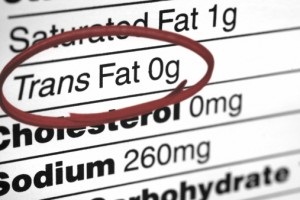- Like
- Digg
- Tumblr
- VKontakte
- Buffer
- Love This
- Odnoklassniki
- Meneame
- Blogger
- Amazon
- Yahoo Mail
- Gmail
- AOL
- Newsvine
- HackerNews
- Evernote
- MySpace
- Mail.ru
- Viadeo
- Line
- Comments
- SMS
- Viber
- Telegram
- Subscribe
- Facebook Messenger
- Kakao
- LiveJournal
- Yammer
- Edgar
- Fintel
- Mix
- Instapaper
- Copy Link
We all know that trans fats are found in highly-processed, packaged foods, as well as fast-food fare. But did you know that half of Americans’ trans fats intake comes from animal products?
In fact, trans fats — one of the properties that makes certain foods seem addictive — were only found naturally in animal fat, until food scientists found a way to synthesize trans fats using hydrogenated vegetable oils. However, while increased labeling has helped more people avoid trans fats from processed goods, people are unintentionally consuming trans fats from milk, yogurt, chicken, cheese, sausage, and turkey.
What’s the problem with trans fats? In the video below, Dr. Michael Greger cites research showing that trans fats increase the risk of heart disease, diabetes, aggressiveness, irritability, and even sudden death. Given these scary possibilities, the Food and Nutrition Board at the National Academies of Science says that the only amount of trans fats that humans can consume safely is zero percent. That’s right — zero.
What’s more, according to an article in the British Journal of Nutrition, the trans fats found in animal products are as bad as the partially hydrogenated fats found in processed foods. Dr. Greger reiterates this point, stating that “trans fat intake, irrespective of source, animal or industrial, increases cardiovascular disease risk.”
Trans fats are no good, no matter the source, and Americans should lower their consumption as much as possible in order to maintain a healthy diet. This is all the more important since current food labeling guidelines have been misleading the public. Such guidelines allow foods containing up to 0.5 grams of trans fats per serving to be listed as having zero grams of trans fats. Thus, the next time a product is labeled “trans fat free” don’t let it fool you — in many cases, it may not be.
Fortunately, whole plant foods are completely free of trans fats. In addition to limiting our processed food consumption, we can also add more fruits and veggies to our diet to decrease our risks of diseases and promote good health overall. After all, an apple a day…you know the rest!

